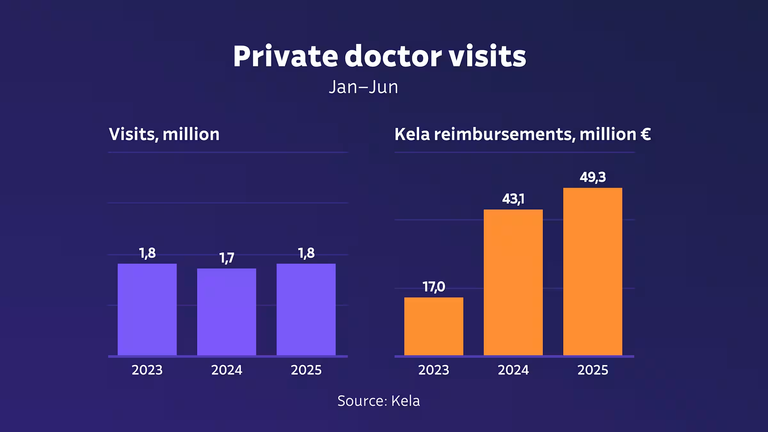I was reading an article from the Finnish news about a decision the government made a couple years ago to increase the reimbursement of visits to private doctors from 8€ to 30€. The goal was to reduce the burden on the public healthcare by encouraging people to use private instead. And as expected, the initiative failed.

While the costs in rebates nearly tripled, the number of visits only increased around 2%. What this indicates is that people who would have used private anyway and paid more, got more back. But few people were convinced to start using private - because the total cost of a visit was still out of reach. Essentially, the government rebated people who didn't need the rebates with value that could have ultimately been used to improve the healthcare for the people who couldn't afford private visits.
This happens a lot with government initiatives, where the "predicted" result doesn't actually factor in human behaviours. Because even if the intention is good, the execution matters and if the system isn't conducive to getting the result, which also has to factor in human behaviours, it isn't going to achieve what was intended. Governments are notoriously bad at predicting human behaviour, while corporations are pretty good at predicting consumer behaviour. However, corporations internally generally act a lot like governments, meaning that they aren't very good at directing their own employees to do a brilliant job, as the messaging is poor, and the incentives are mismatched.
Often, there is more incentive to go opposite to what is intended, than to "do the right thing". Often, the system employed relies on people to act according to what is best for everyone, even though logic says that people will act in their own self-interest, even if that behaviour means hurting their future selves, as well as others. It is the "this is why we can't have nice things" situation, because even if the majority do the right thing, the minority can ruin it for everyone else. Like a playground built for children, and vandalised by teens.
Expecting people to do the right thing, is just not going to happen, so a system has to be robust enough to ensure that either people can't do the wrong thing, or the punishment for doing the wrong thing is so high, they will choose not to do it. The challenge is of course, that it is hard to predict all the "wrong thing" attack vectors without experience, so a system has to be built to evolve as more information comes to light as to how people are actually using it. But, this is data intensive, as well as requiring analysis. It is easier to set and forget, based on assumptions that it is working as intended.
Looking back at the government decision to increase rebates, if looking from the human behaviour view, the expected thing happened.
According to Kela monitoring, private doctor prices rose more than twice as fast as inflation in the first half of 2024, when the government increased Kela reimbursements. Inflation was 3.3 per cent at the time; however, private doctor services became eight percent more expensive.
That's right. So, even though the rebate increased, the private medical suppliers increased their prices at over twice that of the inflation, essentially nulling the effect of the rebate for the majority of users. This means that they were able to maintain the same level of service without even having to hire new people to provide for an influx, and still earn more than they were earning.
"It is, of course, clear that publicly listed companies want to increase their profits,"
The question that should be asked is,
Was this the actual intention?
Taraz
[ Gen1: Hive ]
Be part of the Hive discussion.
- Comment on the topics of the article, and add your perspectives and experiences.
- Read and discuss with others who comment and build your personal network
- Engage well with me and others and put in effort
And you may be rewarded.

I think the main problem with government is that it is very heavily influenced by corporate interests. What is the chance that this whole theory of increasing rebates for the private doctor visits to reduce the burden on public healthcare was promoted by the private healthcare?
In US, they always say: "Private sector is way more efficient than wasteful government" from what I have seen over the last 20+ years as an insider government is most of the time is just as efficient as private industry in many cases a lot more efficient especially if you factor in the much higher cost of private industry employees.
Where government wastes a lot of money is in outsourcing services to private contractors or hiring private contractors to do the work instead of hiring full time employees.
Pretty high I say.
Funny, isn't it? Companies do it too. More companies should be looking to build competence in-house, rather than constant outsourcing.
Insurance is such a racket in general. I hate it. I really do.
For sure. I want to cancel my life insurance. but my wife won't let me. The amount it pays is so low...
Anymore they fight you so much about paying out that it isn't worth the hassle.
Personally, I haven't been to the doctor for 11-12 years. But now my children are undergoing a routine check-up before school and it's awful what queues there are now. Many doctors have appointments 1-2 weeks in advance, and the dentist's is 1.5 months in advance.
Yeah, it is getting worse here too. It used to be really good, now...
I think one of the reasons organizations do an excellent job of predicting consumer behavior is because of the hefty amount of data at their disposal and how they interpret it. Before they present products to the public, they hire professionals in the area of research to see if the product or service will work. The government doesn't do much of this, hence the failure. Come to think of it, the government isn't even that much interested in the welfare of the citizens, so why should they bother about conducting proper research before pushing out an initiative to the general public?
It is funny how all this data is used to make trillions of dollars, instead of billions of healthy people.
The idea that systems often assume people will act in the collective interest drew my attention the most; I think self-interest always dominates, even to our own detriment. The corporations ironic attempts to excel at predicting consumer behavior are due to poor messaging and misaligned incentives similar to governments. It makes me wonder! My question is about behavioral economics; I wonder if it can ever truly guide policy in a way that anticipates these unintended consequences!
I don't think it can do that. However, I think that if all the data was used to impact positively on people's lives, instead of sell them shit for profit, the world would be okay.
I believe some sectors should be entirely state-run, with the private sector having a very small share. These are health and safety. Human life and health should have material value. The state should shoulder all costs and take precautions. Isn't that what the state is for?
In times of volatile inflation, opportunists emerge. Inflation in Türkiye is around 50%, yet goods, food, and labor costs are increasing by nearly 100%. Some believe the government is manipulating inflation data to understate it. But the rate of increase is still unacceptable. For example, last year I paid $5 for my phone bill, but this year I have to pay $10. Isn't there something wrong here?
The state is there to help make a small group of people in the world wealthier.
It is getting out of hand. We supposedly have all the data - but we can't trust any of what comes out of it.
It is indeed disappointing to notice that despite higher rebates, the costs of private healthcare have soared, wiping out any possible advantages for the majority. If only those in charge could take a page from corporate tactics that successfully study consumer behavior. Perhaps, then we would witness improved results.
I am not sure those in charge care. They don't have to live the reality of the 99%
Seems like they just handed out money to people who didn’t need it while the real problems stayed the same. This is a classic case of fixing the surface and ignoring what’s underneath and the real problem will always be there
They don't care about fixing - they just care about putting on a show of distraction so they can go about doing what they do care about.
It's so true, this is so true
Congratulations @tarazkp! You have completed the following achievement on the Hive blockchain And have been rewarded with New badge(s)
You can view your badges on your board and compare yourself to others in the Ranking
If you no longer want to receive notifications, reply to this comment with the word
STOPThis post has been manually curated by @steemflow from Indiaunited community. Join us on our Discord Server.
Do you know that you can earn a passive income by delegating to @indiaunited. We share more than 100 % of the curation rewards with the delegators in the form of IUC tokens. HP delegators and IUC token holders also get upto 20% additional vote weight.
Here are some handy links for delegations: 100HP, 250HP, 500HP, 1000HP.
100% of the rewards from this comment goes to the curator for their manual curation efforts. Please encourage the curator @steemflow by upvoting this comment and support the community by voting the posts made by @indiaunited.